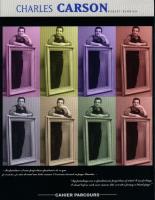 |
|
REVIEW OF ART “LE PARCOURS”
|
EXTRACT FROM DE REVIEW OF ART “LE PARCOURS”
Carson... «My work is a spontaneous projection of what I am feeling ; I stand before each new canvas like a writer facing a blank page.»
Sixteen pages report of Charles Carson … publication Winter 2004,
By : Robert Bernier, historian and art expert.
Modern painting has pushed back the frontiers of the way we represent the world. It realty took off at the end of the second world war, principally in Paris and New York. Whether we like it or not, whether we’re for or against it, painting today is an art form that has been irrevocably transformed. There is no way back, Twentieth century pictorial expression gave birth to a new era, nothing more, nothing less. One of the elements that made this expansion of creative horizons possible was the arrival of new materials like acrylics and their derivatives. Painting is, and always has been, a direct result of the materials used to create it, and the last sixty years have been especially innovative in this sense. The infatuation for untrodden paths, for new materials… in other words for visual exploration, is shared by many artists, among them Montrealer Charles Carson.
|
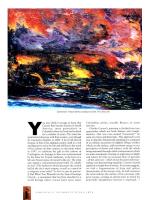
|
|
Carsonism painting
|
Modern painting has pushed back the frontiers of the way we represent the world. It realty took off at the end of the second world war, principally in Paris and New York. Whether we like it or not, whether we’re for or against it, painting today is an art form that has been irrevocably transformed. There is no way back, Twentieth century pictorial expression gave birth to a new era, nothing more, nothing less. One of the elements that made this expansion of creative horizons possible was the arrival of new materials like acrylics and their derivatives. Painting is, and always has been, a direct result of the materials used to create it, and the last sixty years have been especially innovative in this sense. The infatuation for untrodden paths, for new materials… in other words for visual exploration, is shared by many artists, among them Montrealer Charles Carson.
|
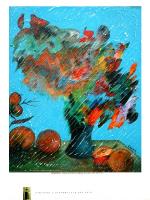 |
|
Carsonism painting
|
You may think it strange to learn that Carson first became known in South America, more particularly in Columbia where he lived and worked for a number of years. The artist has maintained close ties with that country, even though he returned to Québec in 2000. A lot of ink flowed because of him in his adopted country, both in a real and figurative sense : he left and still leaves the mark of his colours on that country, to the point where in 1997, to celebrate his gift to the culture of Carthagena, an homage to him was commissioned by the State Air Transit Authority, in the form of a life-size bronze statue of erected in the city. The artist also signed a monumental mural titled “El caballo de mar” (The Seahorse) which decorates the central hall of the city’s main airport, as well as a mural of a religious scene titled “Yo hice lo que tú queries” (I Did What You Wanted) for the Santo Domingo Church – a monument that has been classified as a world heritage object. Carson knew many major Columbia artists, notably Botero, to name just one.
|
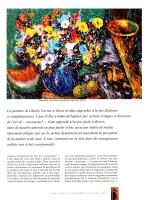
|
|
Carsonism painting
|
Charles Carson’s painting is divided into two approaches which are both distinct and complimentary. One was even named Carsonism by some art critics and historians. This approach is not easy to describe, but generally speaking it is composed of an infinite succession of slightly oblique strokes which, on the surface, add maximum energy to our perception of theme and subject, with the whole being animated through subtle transparencies which are quite sensational, creating an impression of depth and colour. It’s like an incessant flow of particles – all the same size – which sweep the paint with fascinating, even disconcerting regularity. Carson’s second approach is simply that of mosaic. As its name suggests, we find a fragmentation of form and surface characteristic of the mosaic style. In both instances the artist endows the surface of his canvasses with great energy, creating an altered state in which his powerfully metaphorical universe is expressed.
|
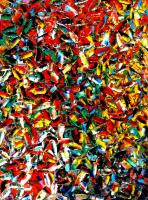 |
|
Ruissellement de la rivière rouge - Mosaique
|
This is especially apparent in works with the bottom of the sea as their theme, which the artist exploits with great accuracy and visual and narrative pertinence. Both approaches are, therefore, explorations, to be viewed with attention for the pleasure and surprise they instill.
I also wanted to mention the artist’s web site : http://www.charlescarson.com In a word, it’s simply fabulous ! Whether you’re a Carson fan or not, you will literally be amazed (the word isn’t too strong, believe me !) by the quality of the site, and especially by the extraordinary flash animations that I usually ignore. Here there is no question of passing them by : you look, and when you’ve finished you only want one thing – to look again ! That says it all, as far as I am concerned. Oh yes, I almost forgot, the site was awarded an Honourable Mention at the 2003 MIM exhibition, an important multimedia congress held annually in Montreal.
If you are still unfamiliar with Carson’s work, or if you haven’t seen what he’s been up to lately, take advantage of the site to bring youself up to date.
You won’t regret it !
*Notably by Louis Bruens, Guy Robert and Jacques de Roussan.
|
|
|